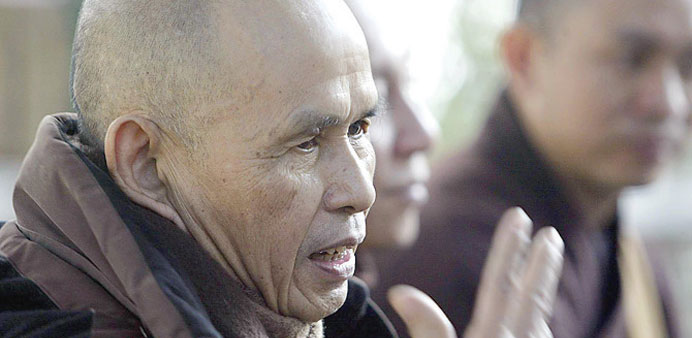Guardian News Service/ New York
Why on earth are many of the world’s most powerful technology companies, including Google, showing a special interest in an 87-year-old Vietnamese Zen Buddhist monk?
The answer is that all of them are interested in understanding how the teachings of Thich Nhat Hanh, or Thay as he is known to his hundreds of thousands of followers around the world, can help their organisations to become more compassionate and effective.
In a sign that the practice of mindfulness is entering the mainstream, Thay has been invited later this month (SEP) to run a full day’s training session at Google’s main campus in California.
Thay, who has sold over 2mn books in America alone, is also meeting more than 20 CEOs of other major US-based technology companies in Silicon Valley, to offer his wisdom on the art of living in the present moment.
He plans to discuss with them how they can develop a deep understanding of the inter-connectedness and inter-dependence of all life and offer practical tools to better integrate mindfulness in their daily work, in the products they design, and in the vision they have for how technology can change the world. The event will end with the practice of walking meditation.
The work of Thay has been acknowledged by several global leaders over the past 50 years. Current World Bank president Jim Yong Kim has said his practice is one “in which one can be deeply passionate and compassionate toward those who are suffering,” while Martin Luther King nominated him for the Nobel peace prize in 1967 for his work in seeking to end the Vietnam war.
King said that conferring the award “would re-awaken men to the teaching of beauty and love found in peace. It would help to revive hopes for a new order of justice and harmony.”
Despite his advancing years, Thay, who was ordained 71 years ago, is currently in the middle of a punishing three month tour of North America, immediately after a similar period running retreats across Asia.
His network of monks and nuns represents the world’s fastest growing monastic order and his week-long retreats in upstate Toronto, New York, Mississippi and California, each with a capacity of more than 1,000 people, have sold out in a matter of days.
Thay, who warns that civilisation is at risk of collapse from the environmental and social damage caused by the voraciousness of our economic system, offers an alternative vision that focuses on true happiness, which he believes we have sacrificed on the altar of materialism.
His teaching is based on transforming our suffering by letting go of the scars of the past as well as worries about the future, via meditation and mindful living.
Pointing to our addiction to consumption as a clear sign we are trying to paper over our suffering, Thay suggests we should go in the opposite direction, to the very heart of our pain, in order to transcend it.
He believes that for business to play a role in slowing the runaway train of capitalism, corporate leaders need to recognise they have made a fundamental error in their narrow-minded belief that profit on its own equates to success.
For that to happen, the corporate world needs to undergo a fundamental shift in consciousness by recognising the importance of integrating spiritual principles into its daily life.
In an interview with the Guardian at the end of his retreat last week in the Catskill Mountains on the art of suffering, Thay said: “You have to consider your idea of happiness. You think it is possible only if you win, if you are on the top.
“But it is not necessarily like that, because even if you are successful in making more money, you still suffer. You compete because you’re not happy and meditation can help you to suffer less.
“Many of us think you can only be happy when you leave other people behind; you are number one. You do not need to be number one to be happy.
“There must be a spiritual dimension in your life and in your business, otherwise you cannot deal with the suffering caused by your work or your daily life.”
Recalling his meetings with King, which were pivotal in the the decison of the civil rights leader to come out against the Vietnam war, Thay said President Obama missed out a key ingredient when he last week celebrated the 50th anniversary of the landmark ‘I have a dream’ speech.

Thich Nhat Hanh.
